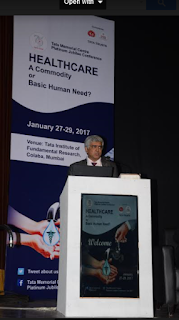Seven countries share models of universal healthcare on first day of the pathbreaking Health Conference organized by Tata Memorial Centre
Photo Caption: Dr. R. A. Badwe, Director, TMC, discussing the TMC model as part of the session on ‘Sustainable models of Health Institutions’ at the 75th anniversary of the Tata Memorial Centre at the Tata Institute of Fundamental Research, Mumbai on Friday.

Sustainability, efficiency, accountability, scalability and government spending discussed as key for India to meet its 2030 UHC goals
January 27, 2017: Dr. Rajendra Badwe, Director, Tata Memorial Centre, inaugurated a 3-day healthcare conference today, held to mark the institution’s platinum jubilee, at the Tata Institute of Fundamental Research, Mumbai. The conference, themed “Healthcare: A Commodity or Basic Human Need?”, brings together National and International representatives of health systems across the world, to address this very relevant question.
In his welcome speech, Dr. Rajendra Badwe, Director, TMC, said, “Just like a business, a successful healthcare model requires accountability, affordability, accessibility and sustainability, the only difference being, in the case of healthcare, our primary aim is to reduce customers. This can only be achieved with the support and commitment of all stakeholders, and this is what we hope to achieve through our conference.”
Day one of the conference brought together leading health experts from Brazil, Thailand, Zambia, Japan, Iran, France and Cuba, who shared examples of their country’s health systems and efforts to achieve universal health coverage. The various opportunities and challenges for a country on the road to UHC were discussed and deliberated, a discussion that has enormous national implications for India, in its journey to achieve the SDG goal of universal health coverage by 2030.
Sanjay Oak, Former Director (Medical Education & Major Hospitals), MCGM, said “Today, it has become increasingly evident that an efficient public private model is crucial to provide accessible and affordable healthcare, especially in a developing country like India. For us to achieve UHC, we must focus on the sharing of ultra-high cost equipment and resources, along with evolving a sustainable PPP model that is suited to meet our country’s health needs.”
Richard Sullivan, Director of the Institute of Cancer Policy at King’s Health Partners Integrated Cancer Centre, London, added, “It is imperative to have yardsticks to measure parameters such as quality, access and affordability, to arrive at a health model that can efficiently deliver healthcare to every region of the country. We tend to measure what is easy, but not what we need to. Our focus should not be on whether the public or private sector does it better, but on identifying the opportunities and gaps within each model, which will in turn help improve healthcare delivery uniformly, by a great degree.”
Commenting on the Conference, Mr. R. K. Krishnakumar, Trustee, Tata Trusts, said, “Tata Memorial Hospital was instituted by Tata Trusts and it is indeed an honor for us to co-host this conference that marks its platinum jubilee celebration. Over the years, Tata Trusts has been working relentlessly to ensure the provision of equitable, affordable, high quality and sustainable healthcare that is universally accessible using technology, system strengthening, research and other international best practices. We are positive that the outcome of this conference will only help to strengthen this endeavor.”
About Tata Memorial Centre
Tata Memorial Centre is the premier cancer care facility in India which has been at the forefront in the fight against cancer since the past 75 years. The mandate and objective of the centre is to provide comprehensive care in the field of cancer which includes Education, Awareness, Prevention, Treatment, Rehabilitation and Palliation etc.
Approximately 200 new cases everyday come from all over India and also from outside the country. Tata Memorial Hospital is a Grant in Aid Institution under the Dept. of Atomic Energy, Govt. of India and it treats 60% of the cancer patients almost free of charge.
